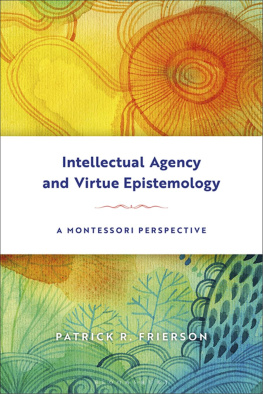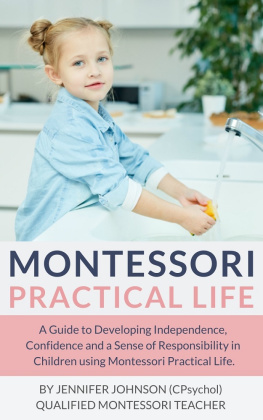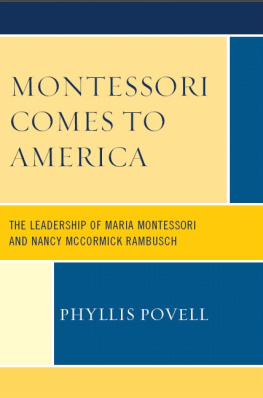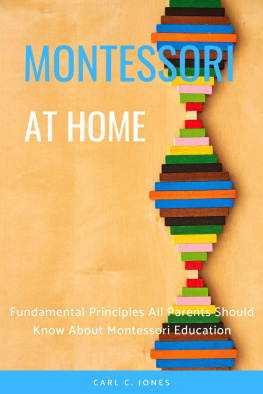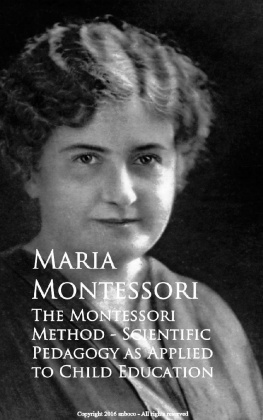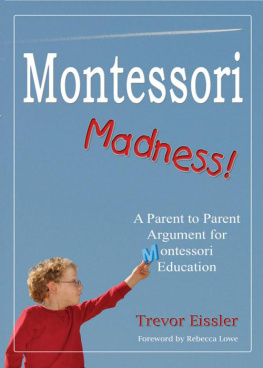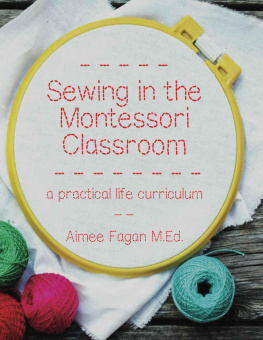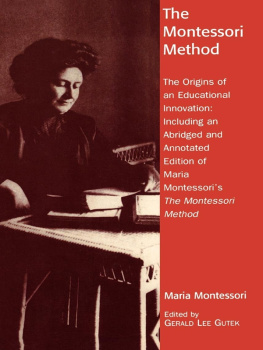Frierson Patrick - Intellectual Agency and Virtue Epistemology: a Montessori Perspective
Here you can read online Frierson Patrick - Intellectual Agency and Virtue Epistemology: a Montessori Perspective full text of the book (entire story) in english for free. Download pdf and epub, get meaning, cover and reviews about this ebook. year: 2019, publisher: Bloomsbury Publishing Plc, genre: Romance novel. Description of the work, (preface) as well as reviews are available. Best literature library LitArk.com created for fans of good reading and offers a wide selection of genres:
Romance novel
Science fiction
Adventure
Detective
Science
History
Home and family
Prose
Art
Politics
Computer
Non-fiction
Religion
Business
Children
Humor
Choose a favorite category and find really read worthwhile books. Enjoy immersion in the world of imagination, feel the emotions of the characters or learn something new for yourself, make an fascinating discovery.
- Book:Intellectual Agency and Virtue Epistemology: a Montessori Perspective
- Author:
- Publisher:Bloomsbury Publishing Plc
- Genre:
- Year:2019
- Rating:5 / 5
- Favourites:Add to favourites
- Your mark:
- 100
- 1
- 2
- 3
- 4
- 5
Intellectual Agency and Virtue Epistemology: a Montessori Perspective: summary, description and annotation
We offer to read an annotation, description, summary or preface (depends on what the author of the book "Intellectual Agency and Virtue Epistemology: a Montessori Perspective" wrote himself). If you haven't found the necessary information about the book — write in the comments, we will try to find it.
Frierson Patrick: author's other books
Who wrote Intellectual Agency and Virtue Epistemology: a Montessori Perspective? Find out the surname, the name of the author of the book and a list of all author's works by series.
Intellectual Agency and Virtue Epistemology: a Montessori Perspective — read online for free the complete book (whole text) full work
Below is the text of the book, divided by pages. System saving the place of the last page read, allows you to conveniently read the book "Intellectual Agency and Virtue Epistemology: a Montessori Perspective" online for free, without having to search again every time where you left off. Put a bookmark, and you can go to the page where you finished reading at any time.
Font size:
Interval:
Bookmark:
Intellectual Agency and Virtue Epistemology
Also available from Bloomsbury
A Critical Introduction to the Epistemology of Perception, by Ali Hasan
Epistemology: The Key Thinkers, edited by Stephen Hetherington
Free Will and Epistemology, by Robert Lockie
Free Will and Gods Universal Causality, by W. Matthews Grant
Intellectual, Humanist and Religious Commitment, by Peter Forrest
The Bloomsbury Companion to Epistemology, edited by Andrew Cullison
Intellectual Agency and Virtue Epistemology
A Montessori Perspective
Patrick R. Frierson

For my mother and father, who gave me the freedom to become the intellectual agent I am today.
Intellectual agency depends upon participation in communities of inquiry. This book, as the fruit of such agency, could not have come to fruition without intellectual virtues of many other inquirers. My students at Whitman College, particularly those in my Education and Autonomy courses, helped me discover Montessori as we worked out together many of the initial ideas that eventually made their way into this book. They made the scholarly and philosophical work of this book a source of joy. A series of student research assistantsJack Eiford, Sarah Vesneske, Lauren Wilson, Sophia Strabo, and Jiayu Zhangdiligently helped me find relevant secondary literature and draft key chapters of the book. Jason Baehr, and later Robert Roberts, patiently introduced me to virtue epistemology and helped me see how to apply Montessoris ideas to it. Elizabeth Barnes graciously read part of Chapter 8 and not only improved that chapter but also helped bolster my courage to publish it. Mark Alfano provided me with an early draft of Epistemic Situationism as I was starting on Chapter 5. Anonymous reviewers for Bloomsbury, as well as for articles in the British Journal of the History of Philosophy, The Australasian Journal of Philosophy, and Synthese, provided invaluable feedback that strengthened the book. For someone venturing into a new subfield, the sort of sharp, substantial, and constructive feedback provided by these reviewers was necessary and exemplary. At Bloomsbury, Colleen Coalter not only found excellent reviewers, but helped me refine my ideas into this book, and Becky Holland provided important editorial support in its late stages.
Throughout this project, Whitman College provided sabbatical and summer support, including support for several research assistants. The Earhart Foundation and Spencer Foundation provided funding from the beginning of my work with Montessori, and the Spencer Foundation also provided funds to bring this work to completion.
The Montessori community has also been crucial as I have worked on this project. I particularly thank Joke Verheul, Archive and Publication Coordinator at the Association Montessori Internationale. Not only did she answer every obscure question about Montessori that I threw at her, but she read the penultimate draft of the book, correcting errors, adding important background, and highlighting passages from Montessori that I might have taken out of context. Alexander Henny, the director of the Montessori-Pierson Publishing Company, granted permission to quote Montessoris works. I also thank White Bear Montessori School for permission to use the photo in my Introduction. Most importantly, I have had the privilege to be a part of the community at Three Tree Montessori School. Partly through participation in Academic Excellence and Strategic Planning Committees, but mostly through endless hallway conversations and help in various classrooms, Ive had the chance to see and hear how Montessori gets put into practice in the lives of actual children. Im particularly grateful to Julie, Rhea, Elizabeth, Linda, Gerri, and Tom for helping me see what Montessori's philosophy looks like in real life.
Above all, I thank my family. My childrenZechariah, Phoebe, and Cyrusremind me that agency in general, and intellectual agency in particular, is playful and energetic and fun. Their love and patience and character have given me the freedom to work on this project, and they have borne with their father even when he shooed them away to finish his work. Katheryn, with whom I have had the pleasure to raise these children, initiated my interest in Montessori when she gave me a copy of Montessori from the Start over a decade ago as we expected our first child. She, too, has been an important part of making me the intellectual agent that I am. Finally, my parents, without knowing or needing to know anything about virtue epistemology or Maria Montessori, nonetheless laid a strong foundation for my development as a thinker and as a person. I dedicate this book to them.
In 1901, at the age of thirty-one, Maria Montessori enrolled as a doctoral student in philosophy at the University of Rome. By this time, she had already completed her medical degree, had a private medical practice, had served as a lecturer and research assistant, and had been appointed co-director of a major new initiative: an orthophrenic school for children with disabilities. She represented Italian women at a major feminist conference in Berlin and was widely seen as a rising star in the medical establishment. In her psychiatric work with children, this woman who had once sworn that she would be anything but a teacher (Standing 1984:23) had come to think that mental deficiency was more of an educational than a medical problem (2:21). She traveled to Paris and London to study the works of Jean Marc Gaspard Itard and douard Sguin, pioneers in pedagogy for disabled children. She conducted research, wrote articles, and gave speeches on treatmentsmostly pedagogicalfor those with various intellectual deficiencies. Her work with intellectually disabled children suggested to her that the methods I was employing contained educational principles more rational than those then in use (2:22). Despite her strong empiricist background and even a resistance to abstract philosophical ideas that have no relation to the human individual[s] actual life (Montessori 1913:14), she nonetheless felt a need to enroll as a student of philosophy in order to conduct a thorough study as part of preparing myself for an unknown mission (2:23). Montessori never completed her degree in philosophy, taking on a teaching position in anthropology in 1904 and eventually moving full time into the development of her own educational method. Her early recognition of the centrality of a solid philosophical understanding for her pedagogy manifested itself, however, in a set of pedagogical writings that are exemplary for their range of philosophicalnot merely pedagogicalinsights.
Among the most important philosophical principles Montessori emphasized was the centrality of agency for human life. After early empiricist and even positivist emphases, she came to resist passive notions of the intellect as mere receptacle for knowledge or information. Instead, she describes intelligence as literally the sum of activities which enable the mind to construct itself, putting it into relation with the environment (9:147). To be an intelligent person is to actively take in and process the world around one and to use the results of that cognitive self-construction in order to enhance activity in the world. With her emphasis on agency came the centrality of various intellectual virtues: The virtues are the necessary means, the methods of existence by which we attain to truth (9:103). Much of Montessoris epistemology involves the clear articulation, elucidation, and defense of intellectual virtues that excellent epistemic agents have, and that children develop when given freedom in the right environment. She provides an impressive agency-oriented epistemology that can make significant contributions to contemporary philosophical discourse.
Next pageFont size:
Interval:
Bookmark:
Similar books «Intellectual Agency and Virtue Epistemology: a Montessori Perspective»
Look at similar books to Intellectual Agency and Virtue Epistemology: a Montessori Perspective. We have selected literature similar in name and meaning in the hope of providing readers with more options to find new, interesting, not yet read works.
Discussion, reviews of the book Intellectual Agency and Virtue Epistemology: a Montessori Perspective and just readers' own opinions. Leave your comments, write what you think about the work, its meaning or the main characters. Specify what exactly you liked and what you didn't like, and why you think so.

